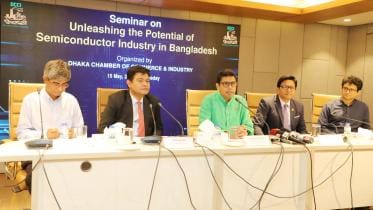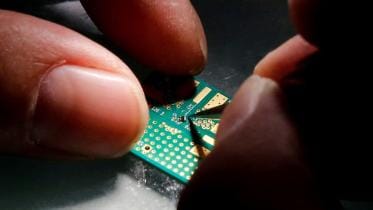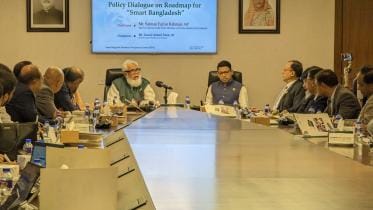Semiconductor industry
VLSI training institute launched in Bangladesh
Ulkasemi VLSI Training Institute (UVTI), an initiative by Ulkasemi, a semiconductor design company, was inaugurated in Niketan, Dhaka, on November 11.
11 November 2025, 15:01 PM
Chip industry seeks Bida’s backing to build $1b export hub
Bangladesh’s semiconductor industry, still in its infancy, has outlined an ambitious vision to emerge as a $1 billion export hub for chips and embedded systems by 2030.
17 September 2025, 18:00 PM
Bangladesh, China forge partnership to boost semiconductor industry
The partnership aims to promote technology exchange, research collaboration, and workforce development
25 August 2025, 12:44 PM
Can Bangladesh become a key player in the global semiconductor industry?
While building fab facilities and manufacturing chips may require a huge sum of investment and time, there is another field that launched Bangladesh into the stage of the semiconductor industry - the VLSI (Very Large-Scale Integration), a process for creating complex ICs by designing semiconductor chips.
7 January 2025, 03:34 AM
Can Bangladesh be a semiconductor hub?
The semiconductor manufacturing sector is well-known for its complexity, high stakes and intense corporate competition. Demand has always been driven by innovation, with every new technology changing the game.
16 June 2024, 01:35 AM
Semiconductor makers have potential to earn $10 billion by 2041: Palak
Bangladesh would be able to earn $10 billion from semiconductor manufacturing by 2041 if proper policy support is ensured, according to Zunaid Ahmed Palak, state minister for telecom and ICT.
15 May 2024, 13:31 PM
Semiconductors can be the new RMG
Bangladesh's endeavour to become a knowledge-based economy has already gained significant momentum.
28 September 2023, 14:00 PM
Bangladesh can become a semiconductor packaging hub
Bangladesh can position itself to be an active player, particularly in semiconductor packaging.
18 May 2023, 02:00 AM
‘Bangladesh has potential to ship $3 billion semiconductors in five years’
PM’s Adviser Salman F Rahman says
6 March 2023, 11:54 AM








